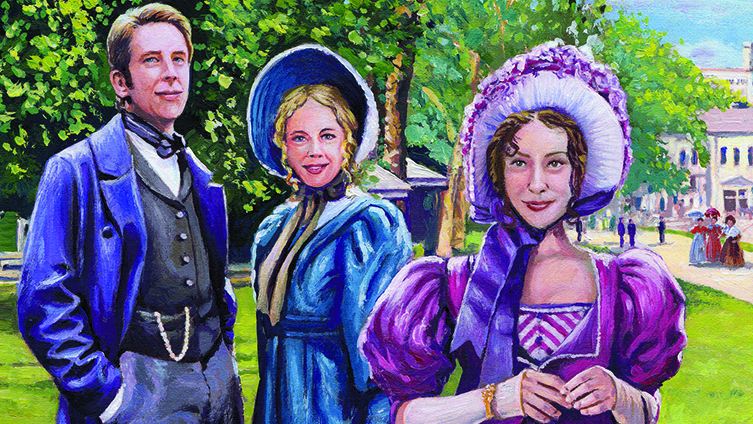On Distant Shores – Episode 26

“Ian, what is troubling you?”
Ian looked up from his mostly untouched meal to smile ruefully at his wife. Caroline gazed at him, a frown between her fine brows.
“I apologise. I’m not very good company tonight.”
“You are brooding,” she told him. She neatly forked a sliver of lamb and gave him a look of both reproof and concern. “What is wrong?”
He sighed, not wanting to trouble Caroline with his worries, but also reluctant to alienate her further by refusing to discuss his work. The last few weeks they had called a silent, uneasy truce, not speaking of his research with Mr Wells on the use of ether as an anaesthetic.
Ian’s happy news that the Chief of Surgery at Massachusetts General Hospital was willing to allow an experimental surgery in the revered Bulfinch operating theatre had been overshadowed by Caroline’s distress that he was still unwilling to use her uncle’s money to fund his work. Rydell had always been an enemy of Ian’s, and even now, nearly 20 years later, he could not let it go.
“Ian?” she prompted softly. “Will you tell me?”
He heard a trembling thread of uncertainty in her voice and guilt and regret both assailed him.
“Of course, my dear. I’m only thinking of the surgery Mr Wells is to perform next month. It is so important that it is successful.”
“So what is your concern?”
Ian gave a little shake of his head.
“There is simply so much depending on it. If it does not go well, the work shall be set back indefinitely, perhaps for ever.” He knew he sounded melodramatic, but he could not shake the feeling that if he and Mr Wells suffered a public failure and humiliation in the hospital’s operating theatre, no-one would ever take ether – or him – seriously again.
Caroline took a sip of her wine.
“But there is no reason to think it will fail, is there? Your experiments in Hartford have been overwhelmingly successful.”
Ian felt a surge of love and admiration for his wife. He knew she disliked the way he kept his research apart, and he understood she was trying now to remain even-tempered and solicitous. It was an effort to restore harmony to their marriage that he greatly appreciated.
“They have,” he agreed after a pause. “But I fear Mr Wells has not quite been himself the last few times I visited.”
Caroline stared at him, her frown deepening.
“Is he unwell?”
“I believe so,” Ian said cautiously, for he was reluctant to admit even to himself the probable cause of his colleague’s ill health.
“I fear you are not being honest with me,” Caroline said, “or perhaps even yourself, Ian. There is no shame in being ill, yet you are looking as if you are ashamed on Mr Wells’s account.”
Ian gave her a small smile.
“You know me too well, my love. It is true, I am worried and even ashamed on Mr Wells’s behalf, for I fear his ill health is indeed shameful.” He took a breath. “He has been forgetful, disorganised, and his hands tremble.”
“What,” Caroline asked, “is the shame in that?”
“None, if you take each symptom by itself. But as a whole . . .” He trailed off, shaking his head, and Caroline simply waited. “They are all symptoms of addiction to ether,” Ian confessed quietly. “The substance we have been using for our operations.”
“Addiction.” Caroline paled, and Ian regretted mentioning such a thing. It was surely no topic for conversation with a lady over the dinner table, or even at all.
“I’m sorry, my dear. I should not have spoken of it.”
“Nonsense, Ian. I may be a gentlewoman, but I am no wilting lily! It is simply a terrible thing to consider.” She paused, frowning in thought. “If he is addicted to this substance, as you suspect, he surely cannot be trusted to perform the operation.”
“Yet it is the culmination of his life’s work.” Ian could not imagine Wells stepping aside for any reason.
“And yours as well,” Caroline reminded him. “If Mr Wells cannot perform the surgery, Ian, the solution is obvious. You must do it.”













